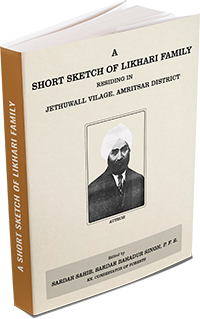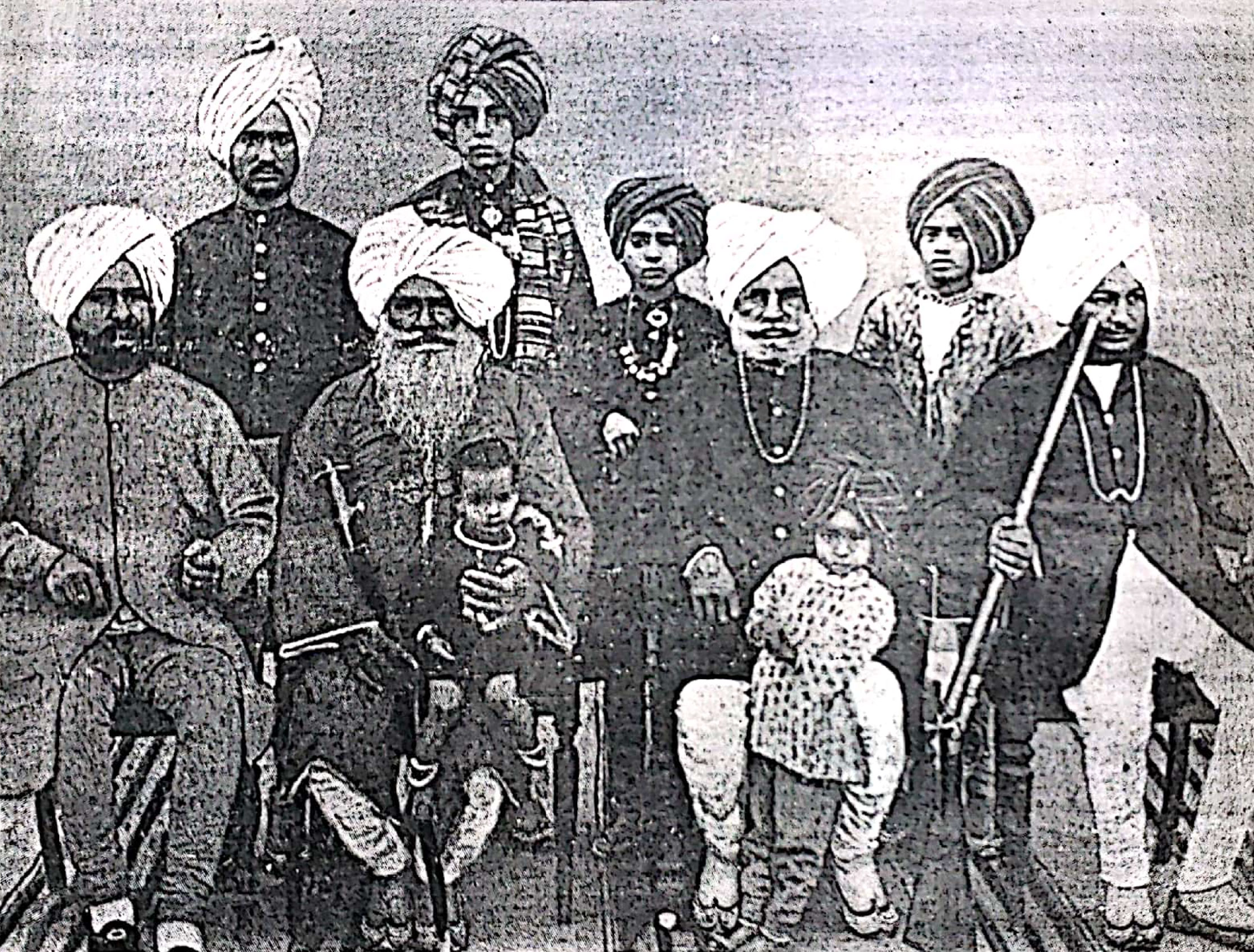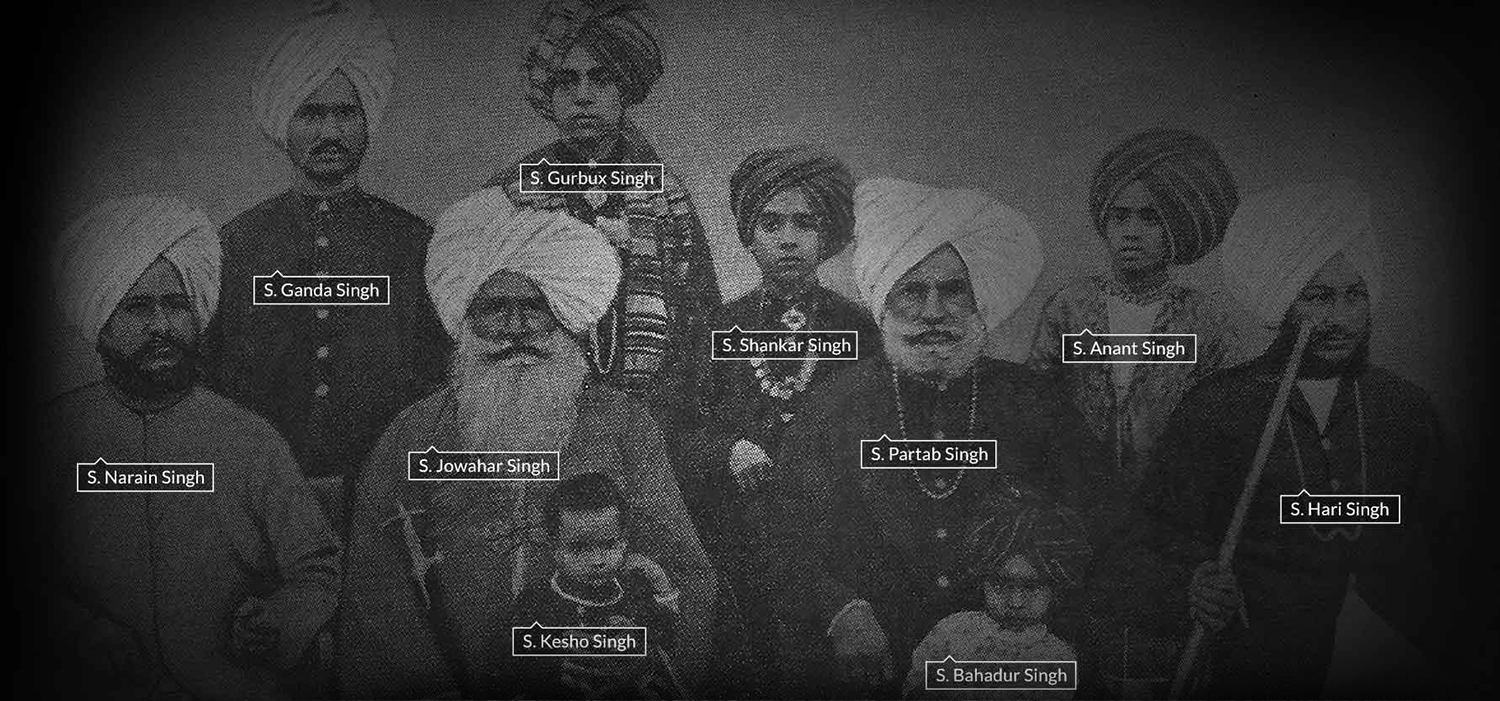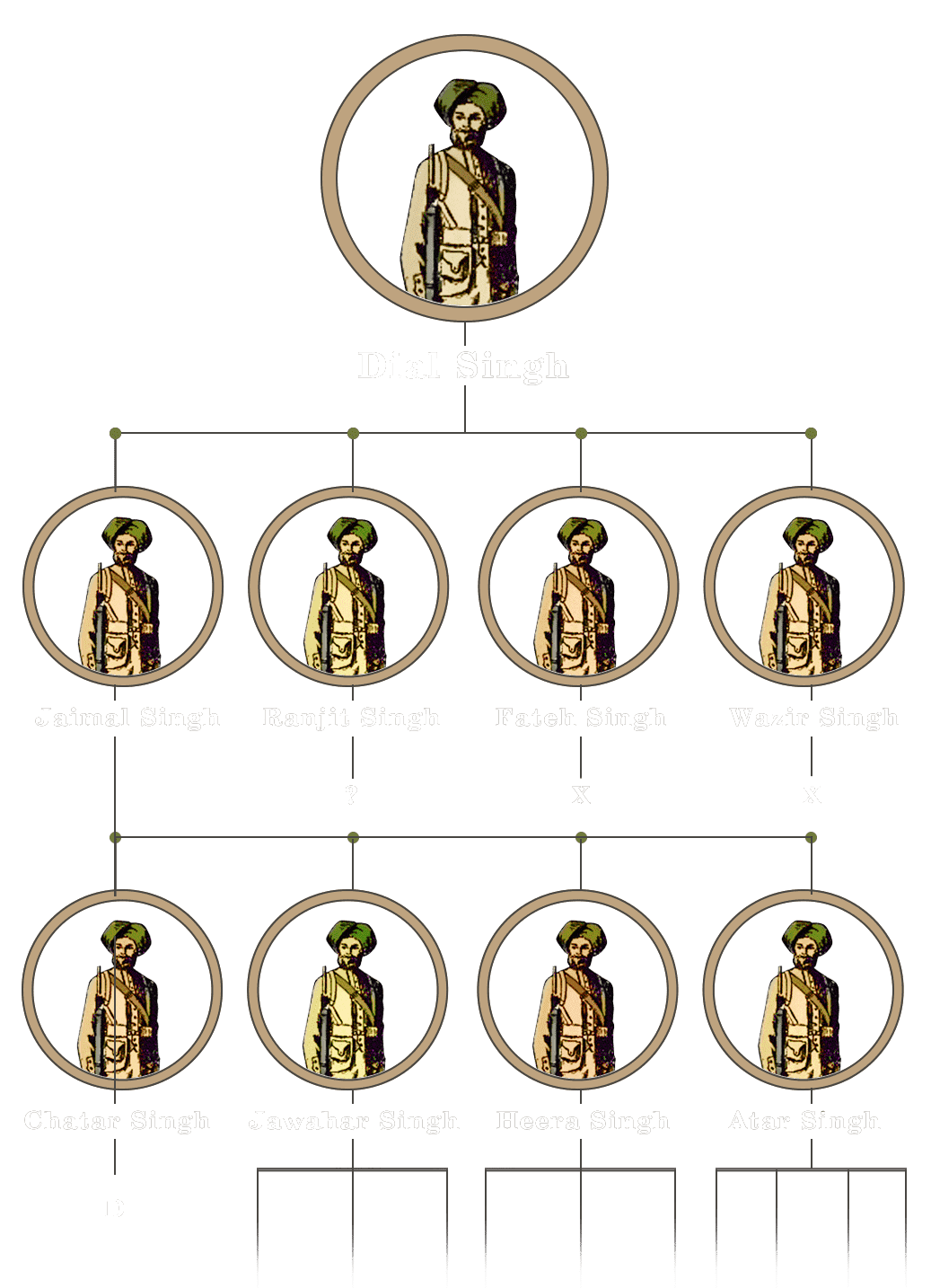S. Dial Singh – Founder of Likhari Family
S. Dial Singh Likhari was a Sikh Warrior and a literate person who lived sometime during the period of Maharaja Ranjit Singh (1780-1839). He came from a peasant stock of “Dham Gotra” a sturdy race of Rajput who originally lived in village Piplanwala, Hoshiyarpur district. They led a migratory life until circumstances forced them to make alliance with “Ramgariah misel” under the leadership of Sardar Jassa Singh. (1723-1803).
Sardar Dial Singh in alliance with Ramgariah Misel captured two villages viz; Warpal and Chatiwind by force of arms for their factional rule. Maharaja Ranjit Singh after assuming the Sovereignty of Punjab, confiscated the above two villages and granted instead two other villages in Jagir viz; Mullawalla and Bahminianwalla lying in Bist Jullundar. As required from recipient of jagirs; Sardar Dial Singh (Likhari) supplied to the “Sarkar” 22 fighting “Sowars” for the Sikh army in consideration for this Jagir grant.
During the turbulent days, S. Dial left his original place of residence in Dhand Kasel, and migrated to live in a vacant place, later named Jethuwall, a village in Amritsar District where his descendants lived and even continued to live till now. Sardar Dial Singh had been the only literate person living in this village at that time.in early unsettled times,literacy had been uncommon and rare, especially in rural areas. a literate person living in a village was considered useful member as he could read and write letters etc. for them. S. Dial Singh as such was called by the surname “Likhari” (literally one who can write). His descendants likewise were called by the common usage of the said term “Likhari”. Thus, Sardar Dial Singh was Known as the founder of Likhari Family.
Sardar Dial Singh had four sons, namely S. Jaimal Singh, S. Ranjeet Singh, S. Fateh Singh and S. Wazir Singh; out of them the last two named S. Fateh Singh and S. Wazir Singh died issueless. Regarding S. Ranjeet Singh nothing is known about him and no feedback is available. The present likhari family as such is a shoot of S. Jaimal Singh. who was a brave Sikh Army Man.
S Jaimal Singh
S. Jaimal Singh was a brave Sikh Army man. He had four sons viz; S. Chattar Singh, S. Jawahar Singh, S. Hira Singh and S. Attar Singh. All the four Sons were Army men who fought heroically in different theatres of Sikh Wars.
As a brave son of a brave father, S. Chattar Singh was killed in action in Firoze-shah campaign during, 1845. He left behind no male issue, and his widow being a highly respected old lady died at a full ripe age of about 90 Years. Her daughter had a son (Rajinder Singh), who died in his youth, leaving behind a son, S. Amolak Singh who was an office in the Education Department. The other son S. jawahar Singh valiantly fought in Mudki, Subhraon and Ferozeshah campaigns and his left-hand toe slashed, and horse killed in action. S.Hira Singh Jamedar was also a brave soldier. He served under the British with great distinction. S Attar Singh was both brave and fortunate having prosperous descendants. He joined sikh Army and later served under British also. These brave soldiers will keep alive their memories for all time to come and Likharies will also be remembered for their trait of Military acumen and bravery.
Preface
Family History is important because it furnishes a valuable contribution to its descendants. From family history, descendants come to know about their ancestor’s notable deeds, spirit of service to mankind and sacrifices they made for their country which inspire future generations to build good and strong character which goes to make a nation. Thus, the family history infuses spirit of love, bravery, education, path and truth and virtue and sacrifices for others. The descendants draw its inspirations to progress and prosperity on the instance of their forefathers. While the lessons can be drawn from their misdeeds.
Read MorePreface
Family History is important because it furnishes a valuable contribution to its descendants. From family history, descendants come to know about their ancestor’s notable deeds, spirit of service to mankind and sacrifices they made for their country which inspire future generations to build good and strong character which goes to make a nation. Thus, the family history infuses spirit of love, bravery, education, path and truth and virtue and sacrifices for others. The descendants draw its inspirations to progress and prosperity on the instance of their forefathers. While the lessons can be drawn from their misdeeds.
In good olden days family history was not considered important and necessary in our country, particularly in the villages where majority of population was living. This is perhaps due to the reason that they never felt its necessity as they were living together in groups at one place/village and mirasees attached to each group of families were keeping comprehensive record of members. They used to recite them “Kalan Karo” in genealogical order on special occasions such as births and marriages. In this manner continuous repetition of family names became a common feature of village community. This tradition was helping families to know about their other relatives and ancestors etc. Similarly, Rajput’s in Rajasthan have got institution in of "Bahi-Bhats" who sing the valorous deeds of their ancestors to buck up the spirit of courage and chivalry of Rajput’s. Also, the bards (Poets) use to sing the various deeds of past martyrs to rouse the nation from its lethargy and infuse in them the spirit of sacrifices for a notable cause.
With the dispersal of families due to various reasons like job opportunities, education and emergence of new industrial and technical hubs the members of the families moved to various cities and their links with their families started declining. During the last few decades many of them even migrated to foreign lands and their contacts with families is slowly reducing. A stage is not far when relationship between families will be forgotten to determine who is who.
The need of Likhari family history was felt necessary by one of our ancestors Sardar Sahib Sardar Bahadur Singh P.F.S (Born 1884) Ex Conservator of Forest. He published a book Titled (A Short Sketch of Likhari Family Residing in Jethuwall Village, Amritsar District in 1960, Giving Details of the Likhari Family.) In the Foreword he has mentioned that luckily he had in his possession an old “Shajra Nasab” with minor details by which he was prompted to draw a sketch of Likhari family on the basis of his personal knowledge and contacts with Likhari Family members, he being the oldest male member of the Likhari Family.
He also mentioned this “Shajra Nasab” was written in a memorandum form by late Sardar Bur Singh Likhari, Daffadar during September 1909 whose initiative in this respect deserves high appreciation for giving a thought of family history.
As the Likhari family literature was published in 1960, We strongly feel that Likhari family history should be updated because families have extended during the last five six decades and our young generation have moved to far off cities and many of them have even migrated to other countries. Their contacts with each other have reduces to great extent and situation is coming when they will be strangers to their own relatives of the Likhari Family. We therefore felt that a system should be developed so that future generations can know the history wherever they are residing, and we can also continue updating bio data of their new family members. I therefore started designing and building Likhari Family Wb site and Portal. My Dad Sardar Gurnam Singh Likhari has been very instrumental in Assisting me for sourcing and assembling information.
Dear Likhari Family members we are Delighted to present this Likhari Family web site / Portal. This site provides details of all our ancestors and current family members. This site has the provision of self-building future database. Chosen Administrators can continue updating the database so that future generations can continue updating their information. In designing this website/ portal we have made our sincere efforts to make this as simple as possible easily operate able and technically sound that gives details of any family member, his ancestors and descendants simply a click of a button. Another useful feature has been added that gives how one member is related to another member of any generation of the family. However, there might be some errors and drawbacks which can be brought to notice of listed administrators for rectification. We are Thankful to Sardar Sahib Sardar Bahadur Singh for this publication, without which it was not possible to enter in this endeavour. We also want to thank Sardar Surinder Pal Singh Likhari Son of Sardar Balwant Singh Likhari (Lucknow) and Ms. Zuby Luthta Daughter of Sardar Surinder Singh (London) for Furnishing this history book.
Dallas Tx Aug 2019
Gurmeet Singh Likhari S/o Sardar Gurnam Singh Likhari

Download Book
A Short Sketch of Likhari Family
sardar Sahib, Sardar bahadur Singh, P.F.S (EX. Conservator of Forests)
Download Now




